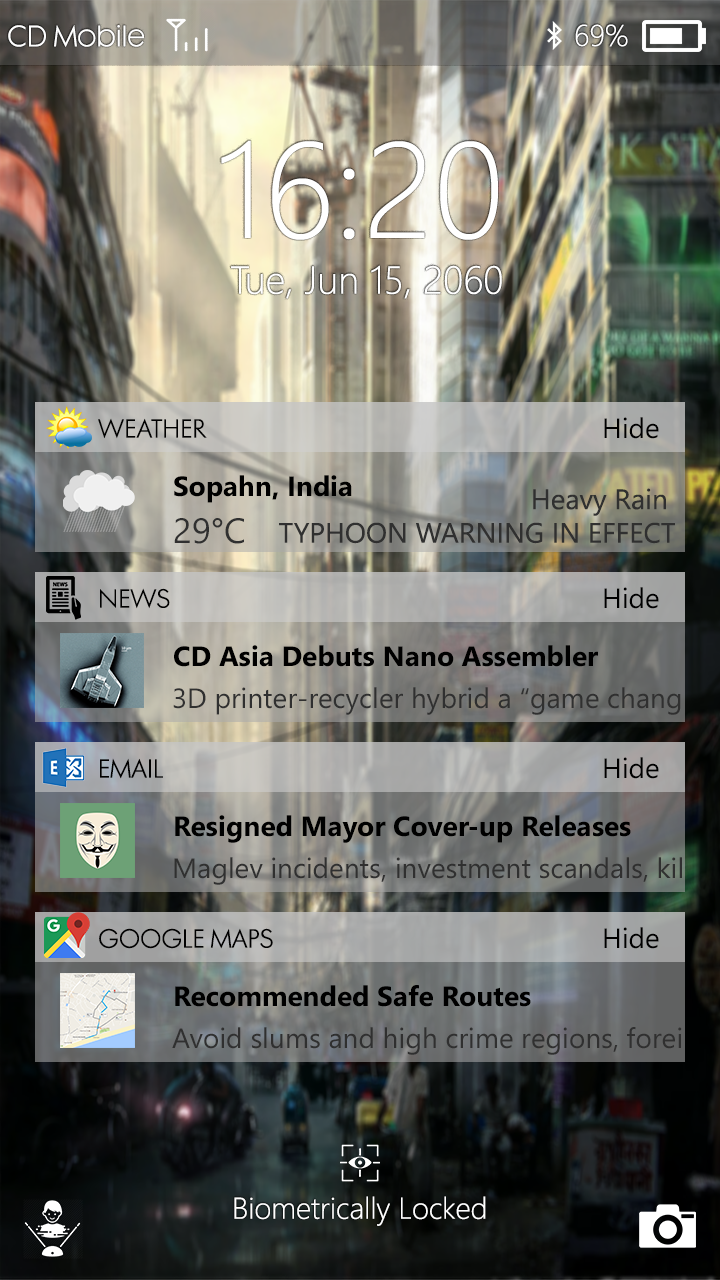Many characters will fall into one of six categories below. However, these aren't limitations and you may create something entirely different.
- Rogues: Shady members of the society; includes criminals and shunned people.
- Public Servants: Folks working for the goal of order. You can be a elected official corruptly lining your own wallet, or a fired cop hunting down thieves on your own terms, or anything in between.
- Corporate: You are an important member of a big company, and being the team player you are, you will everything and anything to make the company better.
- Entrepreneurs: Personal business interest is your interest. Instead of working for existing companies, you are starting your own.
- Citizens: The average Singh doesn't carry too many ulterior motives. With that said, you may as well take advantage of these changing times.
- Outsiders*: You came recently from other parts of India, or maybe, even from another country. Sopahn is an international city; expect no shortage of foreigners.
*The number of foreigner will be limited; maximum one per user.▪ Please
avoid cliché and tried stories and personalities and go for something a bit more diverse. This is a major reason we will be doing background checks. If you basically make the same story over and over, you’re not getting a pass. Do something interesting and don’t go with some tragedy staple for cheap drama in an attempt to make your character look deeper than they are. This doesn’t mean you can’t go for the dead parent/orphaned/mentor figure/home burned down/badass loner/insert something you’ve seen in every RP thread ever, this one not being an exception. It just means we want to see a solid backstory where something like that isn’t used as a weak justification for your character setting out for exploring and never mentioned again or pulled up whenever you feel like your character needs to have an angsty/sad moment. If you actually feel it serves a purpose and makes sense for your character’s development and history, than by all means. Just make sure it’s understandable and a relatively believable subplot.
▪ If you are trying to
omit something in your character sheet saying that it will be revealed later in the RP, we expect to be private messaged about it for approval, but chances are something like that will set off a red flag unless there’s a good reason for it. Since nobody’s meta gaming, we expect everything in the background section of the character sheet to be revealed there. Most of the time, this comes across as lazy and that you can’t be bothered to write something half-decent
▪ Keep in mind the
age or your character in relation to their
physical ability and skill as well as personal
experience. Older characters may not be as strong or have the vitality of younger characters, but they have experienced much and had much longer to master skills, as well as they will generally be much more mature and rational, but will take longer to recover from physically demanding situations, wounds, and may be very set in their ways. Younger characters have the raw strength and vitality that comes with being at the peak of your physical prime, and chances are, they are rash and less disciplined, as well as being susceptible to new ideas and will be generally inexperienced with the world. We do not want to see an entire roster of teenage master hackers, hardcore parkorists and billionaires. If your character is excellent at something at a young age, there must be a good reason for it.
▪ You can only
carry so much on your person at a time. Are you going to be carrying a rocket launcher, a kilometer of steel pipe, a dining table, a full-sized statue of Gandhi, 4000 coins, a 72 inch TV, just as many beer cans and weed, and every assembly manual out of IKEA? Keep it reasonable, keep it realistic. Collecting loot should never be your goal. You should also specify how your character is carrying around most of their
inventory.
▪
Requisitioning takes time to happen. Even with advanced 3D printing, express shipping and digital catalogs, stuff won't teleport into your character's hands.
▪
Cyborg characters are a potential possibility, but this is similar to the weapon rules where it’s going to be based more around role playing than stats. People aren’t going to react well to seeing their buddy turning into terminator, and many of the traditional, paranoid, or sensible types will likely try to end them for it on the spot. If you do decide to go this route, your application will face higher levels of scrutiny than others because we need to make sure that you can actually properly role play somebody who is primarily synthetic.
▪
Medicine takes time to work in most cases, so you're not going to get flattened by a truck and then look brand new by chugging Nano Booster Juiceter™. A med kit can help your body mesh the wounds and heal you, properly made drugs eliminate poisons and disease, and prosthetics can replace your lost limbs, but nothing can help you recover when you are too dead to do so.
▪
Damage is realistic(ish), if you're hit by something heavy or sharp; you're going to need some serious medical attention if it hits something vital. But since this is the future, and health care work in ways that a platypus would say, "that's fucked up", most people also aren’t going to die of a paper cut infection. Your character is mortal and will be taking wounds in combat. Also, weapon and armor will be worn from use, repair is required to keep them going.
▪
Weapons have to reasonable for your character type, and its operational state should be tracked. Things like knives, batons, small arms and homemade bombs are fair game. Vehicle weapons (improvised or purpose built) can be integrated as long as they are within reason. However, this doesn't mean free rein to put ridiculous things like laser blasters or tanks into the game. Keep your kit in line with what someone could have in a real life city.











